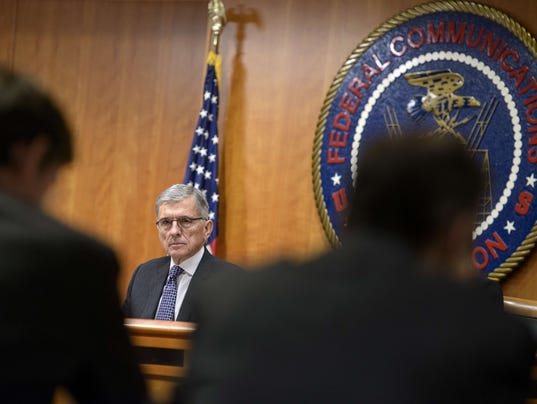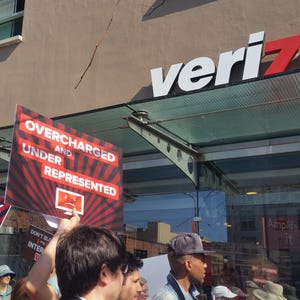Results 1 to 1 of 1
Thread Information
Users Browsing this Thread
There are currently 1 users browsing this thread. (0 members and 1 guests)
-
03-12-2015, 11:49 AM #1
FCC posts its 400-page net neutrality order
FCC posts its 400-page net neutrality order
Mike Snider, USA TODAY11:24 a.m. EDT March 12, 2015
(Photo: Brendan Smialowski, AFP/Getty Images)
Get your reading glasses out and put a fresh pot of coffee on, the Federal Communications Commission just posted a potential bestseller: the net neutrality rules.
Simply entitled Open Internet FCC-15-24A1, the order runs 400 pages. The initial rush to get it from the FCC web site this morning led to some getting an error from the site. But downloading quickly smoothed out by 10 a.m.
The commission voted 3-2 last month to approve the rules to protect an open Internet, or enforce net neutrality, as the principle is often called. The goal of the rules is to establish the FCC's authority to ensure that the Net is equally available to all types of legal content generators.
Internet service providers (ISPs), mostly large cable or telephone companies, are prohibited from blocking or slowing some content and from "paid prioritization" to deliver some content via faster lanes for payment.
The FCC has approved net neutrality rules before, but chairman Tom Wheeler was forced to come up with new ones after a federal court tossed out the previous rules early last year.
While throwing out the rules, that court upheld that the FCC could assert its power to regulate the Internet, but needed to consider the network as a public utility and the ISPs that deliver connectivity as "common carriers." The court also "affirmed the Commission's conclusion that broadband providers represent a threat to Internet openness and could act in ways that would ultimately inhibit the speed and extent of future broadband deployment," the agency says in the order's executive summary.
The FCC spent nearly a year gathering comment from citizens, companies and public interest groups. The agency received a record 4 million public comments on the issue.
In crafting the rules, the agency had three objectives, the order says: "America needs more broadband, better broadband, and open broadband networks. These goals are mutually reinforcing, not mutually exclusive. Without an open Internet, there would be less broadband investment and deployment. ... All three (objectives) are furthered through the open Internet rules and balanced regulatory framework we adopt today."
In the order, the agency says that it is basing its authority on Title II of the Communications Act of 1934 and on Section 706 of the Telecommunications Act of 1996.
Critics of the strategy have argued that Title II regulations could lead to the FCC setting broadband rates and increased bureaucracy. But the FCC has said it has agreed to not forbear from some of the sections of Title II and, for instance, not impose additional taxes or tariffs or require ISPs to unbundle some services or file a burdensome amount of documents.
Federal Communication Commission (FCC) Commissioner Michael O'Rielly, speaks during an open hearing and vote on Net Neutrality in Washington, Thursday, Feb. 26, 2015. (Photo: Pablo Martinez Monsivais, AP)
"There is a reason that Title II has been called the nuclear option. No matter what the FCC tries to do to limit the fallout (and it is not trying very hard to do that here) the decision will still impact investments," said FCC commissioner Michael O'Rielly in a dissenting statement released today. He and fellow Republican commissioner Ajit Pai voted against the rules.
But Wheeler, in his own statement, said that the old rules have been "modernized" for present-day technology.
"Our challenge is to achieve two equally important goals: ensure incentives for private investment in broadband infrastructure so the U.S. has world-leading networks and ensure that those networks are fast, fair, and open for all Americans," he said. "The Open Internet Order achieves those goals, giving consumers, innovators, and entrepreneurs the protections they deserve, while providing certainty for broadband providers and the online marketplace."
There's more to come. The rules don't become law until 60 days after they appear in the Federal Register.
Congress is working on legislation that would supersede any FCC rules. And a court challenge by ISPs is expected, too.
http://www.usatoday.com/story/tech/2...rder/70202668/
NO AMNESTY
Don't reward the criminal actions of millions of illegal aliens by giving them citizenship.
Sign in and post comments here.
Please support our fight against illegal immigration by joining ALIPAC's email alerts here https://eepurl.com/cktGTn
Similar Threads
-
Open Internet order loses. Net Neutrality struck down again.
By kathyet2 in forum Other Topics News and IssuesReplies: 4Last Post: 01-16-2014, 02:20 PM -
Alert: FCC Will Not Release Final Net Neutrality Order 12/21
By HAPPY2BME in forum Other Topics News and IssuesReplies: 4Last Post: 12-21-2010, 02:31 PM -
Page after Page of Reasons to Hate Obamacare
By AirborneSapper7 in forum Other Topics News and IssuesReplies: 0Last Post: 07-26-2009, 12:30 PM -
3 page bailout go's to 450 page bill in 48 hours Yeah Right
By AirborneSapper7 in forum Other Topics News and IssuesReplies: 2Last Post: 10-02-2008, 10:13 PM -
New Posts and Multiple Posts
By JohnB2012 in forum General DiscussionReplies: 1Last Post: 04-07-2006, 01:49 AM


 LinkBack URL
LinkBack URL About LinkBacks
About LinkBacks






 Reply With Quote
Reply With Quote


Illegal immigration is costing American hospitals billions of...
04-27-2024, 07:55 PM in General Discussion